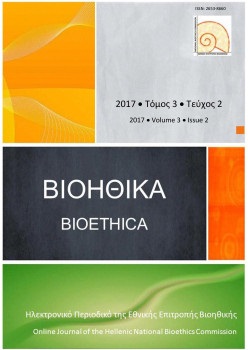Η βοηθική και το επιστημολογικό παράδειγμα της πολυπλοκότητας
Abstract
Σχεδόν μισό αιώνα τώρα η ρύθμιση της βιοϊατρικής έρευνας και των τεχνολογικών εφαρμογών της ιδίως στην ιατρική πρακτική πραγματοποιείται μέσα από ένα καινοφανή συνδυασμό αφενός των θετικών επιστημών με τις ανθρωπιστικές και αφετέρου, της φιλοσοφίας με την κοινωνική θεωρία για την επιστήμη. Ωστόσο ο συνδυασμός τους εξακολουθεί να αποτελεί πρόκληση τόσο πρακτικά όσο και θεωρητικά. Το πρακτικό διακύβευμα είναι το πώς εναρμονίζεται η τεχνοεπιστημονική πρόοδος με την οικονομική και κοινωνική ανάπτυξη που αυτή επιφέρει με την προστασία των φυσικών και κοινωνικών αγαθών καθώς και τον σεβασμό των ατομικών ελευθεριών. Πέραν αυτού όμως η ρύθμιση της βιοϊατρικής αποτελεί και θεωρητικά μια επιστημολογική πρόκληση. Το έργο του εκλειπόντος Θανάση Παπαχρίστου, Kαθηγητή της Νομικής Σχολής του Ε.Κ.ΠΑ. και πρώην μέλους της Εθνικής Επιτροπής Βιοηθικής υπήρξε πρωτοπόρο ακριβώς διότι αντιλήφθηκε την διπλή πρόκληση όντας ταυτόχρονα αστικολόγος και κοινωνιολόγος του δικαίου.
Το άρθρο εξηγεί πρώτον τους λόγους για τους οποίους το έργο του ανοίγεται προς μια δυναμική θεώρηση της ρύθμισης της βιοϊατρικής. Δεύτερον προχωρεί περαιτέρω και αφού παραθέσει τις βασικές θεωρητικές παραδοχές του επιστημολογικού παραδείγματος της πολυπλοκότητας, αναπτύσσει επιχειρήματα υπέρ της υιοθέτησης του για την ερμηνεία και την περιγραφή της βιοηθικής με το βιοδίκαιο και τον συνδυασμό τους στο σύγχρονο μοντέλο ρύθμισης της βιοϊατρικής. Τρίτον εκτίθενται κάποιες σκέψεις σχετικά με την εφαρμογή του παραδείγματος της πολυπλοκότητας στο ελληνικό μοντέλο ρύθμισης της βιοϊατρικής και την δυναμική ανάπτυξης της βιοηθικής στο πλαίσιο του.
Article Details
- Come citare
-
Ρεθυμνιωτάκη (Eleni Rethimiotaki) Ε. (2017). Η βοηθική και το επιστημολογικό παράδειγμα της πολυπλοκότητας. Bioethica, 3(2), 17–25. https://doi.org/10.12681/bioeth.19721
- Fascicolo
- V. 3 N. 2 (2017): Bioethica
- Sezione
- Original Articles
Authors who publish with this journal agree to the following terms:
- Authors retain copyright and grant the journal right of first publication with the work simultaneously licensed under a Creative Commons Attribution CC BY 4.0 License, which allows for immediate free access to the work and permits any user to read, download, copy, distribute, print, search, or link to the full texts of articles, crawl them for indexing, pass them as data to software, or use them for any other lawful purpose. Appropriate credit must be given by citing the author(s) and the original publication in this journal.
- Authors are able to enter into separate, additional contractual arrangements for the non-exclusive distribution of the journal's published version of the work (e.g. post it to an institutional repository or publish it in a book), with an acknowledgement of its initial publication in this journal.
We encourage authors to deposit their articles, as well as data underlying the publications, in institutional and/or other appropriate subject repositories.
Bioethica permits and encourages authors to archive the final publication pdf in institutional (e.g. the repository of the National Hellenic Research Foundation) or other appropriate subject repositories (e.g. SSOAR repository for social sciences), in compliance with institutional and/or funder open access policies, after publication in the BIOETHICA. Authors must provide bibliographic details that credit publication in the journal, as well as related funding details (when applicable).
Lists of institutional and other subject-based academic open access repositories can be found listed by country at the registry http://opendoar.org/countrylist.php
If your institution does not possess a repository you may deposit a copy of your paper at no cost with www.zenodo.org , the repository supported for open access research in the EU by the European Commission, through the project OpenAIRE (www.openaire.eu )



